TŪKAIKAHA NGĀ
KAIMAHI KI TE
NGAHURU TAU
ACKNOWLEDGING A DECADE OF SERVICE

TE AO PŪTAIAO
TE AROTURUKI
O TE PORO
RĀKAU
MANGAOAPA KIWI HABITS EMERGING FROM EARLY DATA
TUPU TE RAU TĀTAI

TŪKAIKAHA NGĀ
KAIMAHI KI TE
NGAHURU TAU
ACKNOWLEDGING A DECADE OF SERVICE

TE AROTURUKI
O TE PORO
RĀKAU
MANGAOAPA KIWI HABITS EMERGING FROM EARLY DATA
TUPU TE RAU TĀTAI
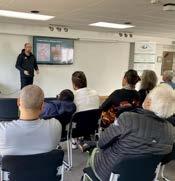
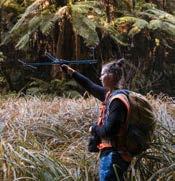
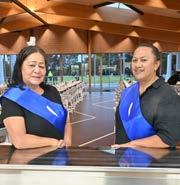
HE TĀNGATA 13 TE RAU KAWARIKI
Associate Director vacancy details.
HE RAUPATU, HE RAUTĀPATU
Future focus for Rau Titikura roadshows. 16 TŪKAIKAHA NGĀ KAIMAHI KI TE NGAHURU TAU
Acknowledging a decade of service.
23 TOITŪ TE MANA O NGĀ WHENUA TŪPUNA I TAKEA MAI
Arbitration next step in rent review process. 24 TE AROTURUKI O TE PORO RĀKAU
Mangaoapa kiwi habits emerging from early data.
28 KEI HEA TE KAU E TE RAU?
Mere the Cow - Where is she now?
30 E TAI E TE AO (te reo Māori article)
Hei kai mā te hinengaro tangata.
31 TE NGATA TE PUKU KI TE AWHIAWHI I A TAMAWAHINE
New wharekai strengthens community bonds at Owae.
TE AO PŪTAIAO
House of Science grant reaches tamariki in Taranaki around the Mounga. 37 NGĀ INGOA O NGĀ RAU HĀPAI O PKW
The meaning and significance of role titles at PKW.
UNCLAIMED DIVIDENDS LIST
Search continues for Te Rau Matangaro / missing shareholders.
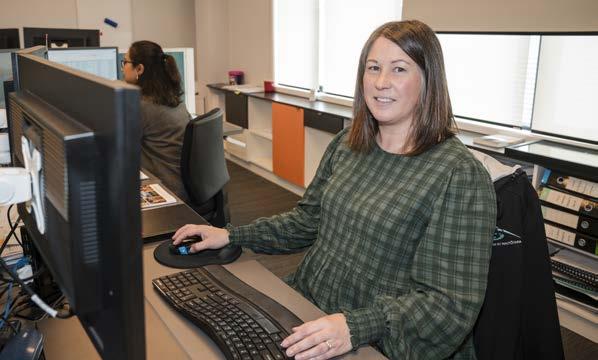
FEATURE ARTICLE
8 TUPU TE RAU TĀTAI TAHUAROA
New Finance Manager, Erena Taylor.
Te Rau Kawariki / Associate Director Applications
Close at 5pm on Wednesday 31 July, 2024
Details on page 13.
Committee of Management nominations
Close at 5pm on Friday 30 August, 2024
Details on page 6.
Annual General Meeting
Saturday 16 November, 2024
Te Upoko o te Whenua Marae
Details on page 5.
Order Annual Report
Details on page 5.
Kurataiao Taranaki
26-27 September, 2024
Kanihi Māwhitiwhiti Pā
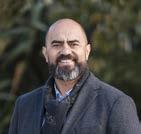
Tērā Puanga ka rewa i te pae Rārangi maunga tū i te ao, tū i te pō Rārangi tangata ngarongaro kau ana Rongo mai whenua nau mai rā, nau mai rā Haramai te hua o te tau hou I te pekanga o te tau I te hanga o Maru e hai!
Puanga is a time for reflection as we remember and honour those who have passed away during the year, and also for whanaungatanga as we plan for the future and anticipate the potential the new year holds for us and our whānau.
It is also an opportunity to look back over the year and recognise the mahi that has been done as we continue to strive towards the fulfilment of our aspirations for the future. I would like to acknowledge the valued contribution to this kaupapa of our Te Rau Whakaihoiho Tonga Karena, Te Rau Māripiripi Kirsty Riddell, and Matt and Jo Downs of Miraka Hipi as they leave us to explore different horizons.
“PROTECTING OUR RESIDENT KIWI AS WE HARVEST THE MANGAOAPA FORESTRY BLOCK IS HELPING TO SET GUIDELINES FOR FUTURE SAFETY OF THESE TAONGA WITHIN THE ROHE OF NGĀTI MARU AND ACROSS THE MOTU.”
PARININIHI KI WAITŌTARA
Postal PO Box 241
New Plymouth 4340
Physical 35 Leach Street
New Plymouth 4310
Tel +64 (6) 769 9373
Fax +64 (6) 757 4206
Email office@pkw.co.nz www.pkw.co.nz
iSTUDIOS MULTIMEDIA
Postal PO Box 8383
New Plymouth 4340
Physical 77B Devon Street East
New Plymouth 4310
Tel +64 (6) 758 1863
Email info@istudios.co.nz www.istudios.co.nz
Just as important is acknowledging those who have served our kaupapa for a substantial length of time. Five of our kaimahi, featured in this edition on page 16, have each been part of our whānau for an entire decade. For me, people are the most important part of any business and for kaimahi to give such a significant part of their working lives to us is humbling. E kore e mutu ngā mihi.
We also celebrate our new Te Rau Tātai Tahuaroa Finance Manager Erena Taylor, on her new role and career path to this point, and the collective contribution of her whānau on page 8.
Protecting our resident kiwi as we harvest the Mangaoapa Forestry Block is helping to set guidelines for future safety of these taonga within the rohe of Ngāti Maru and across the motu—the latest update is on page 24.
The issue also reports on the benefits being realised because of two Te Rau Manawaora / PKW Trust grants. These stories on pages 31 and 34 are uplifting and a source of inspiration for us all.
Nāku iti nei,
Aisha Ross
Te Rau Matomato Chief Executive Officer
WHENUA MAGAZINE
Editor Aisha Ross
Deputy Editor Puna Wano-Bryant
Creative Direction Sheree Anaru
Photography Quentin Bedwell
Graphic Design Cherie Quin
CONTRIBUTORS
Aisha Campbell
Polly Catlin-Maybury
Marama Ellis
Shona Geary
Tonga Karena
Amokura Panoho
PARININIHI KI WAITŌTARA INCORPORATION
Parininihi ki Waitōtara Incorporation & Te Rau Manawaora o Parininihi ki Waitōtara
This year’s AGM for the Parininihi ki Waitōtara Incorporation and the PKW Trust has been scheduled for Saturday 16 November, 2024 at Te Upoko o te Whenua Marae.
9am Pōwhiri and registrations 10am Meeting starts
A formal notice that includes the agenda for both meetings will be published in the next issue of Whenua magazine
A reminder that shareholders who would like a Māori Entrepreneurial Confidence Cadetship and Mentoring Programmes
Inclusion of Māori enterprise Regular Networking events
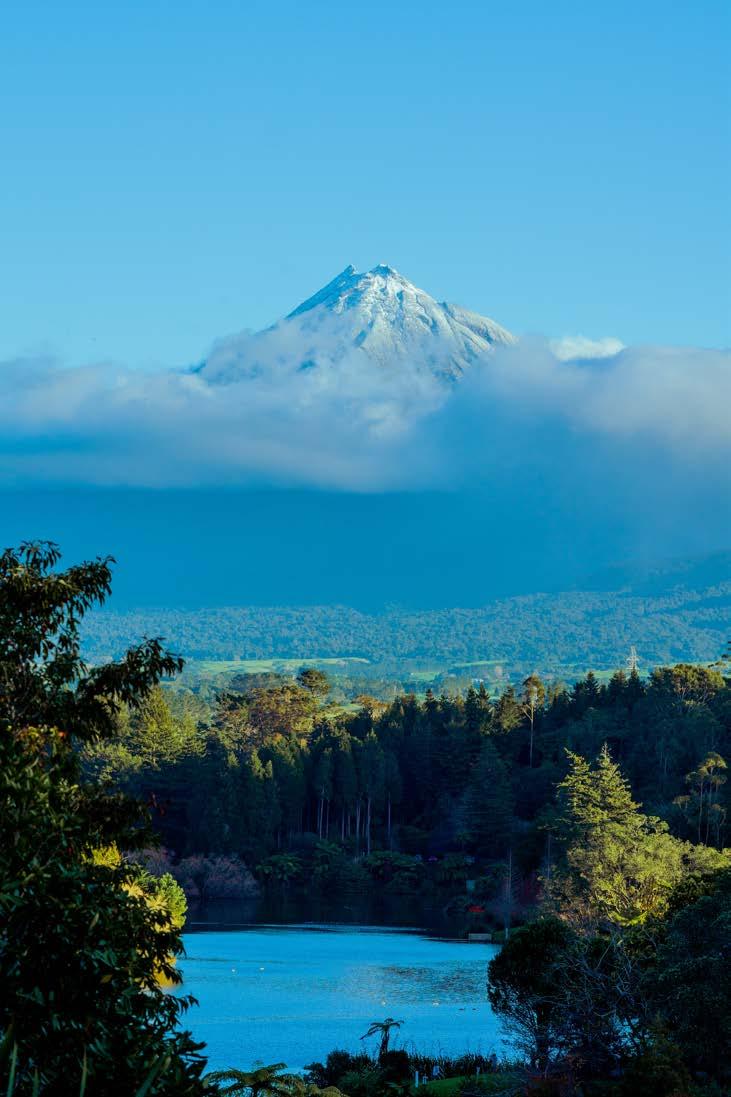


The Committee of Management are the governing board of Parininihi ki Waitōtara Incorporation. The board are made up of seven Committee of Management members who are elected for a three-year term by shareholders. Terms are rotated to ensure continuity and stability of governance.
The Board are responsible for the Incorporation including setting its strategic direction and monitoring performance against the strategy.
Anne-Marie Broughton, Liana Poutu and Serena Fiso are due to retire by rotation at the end of the upcoming 2024 Annual General Meeting (AGM).
Anne-Marie, Liana and Serena are eligible for re-election for a further three-year term and have confirmed they will be standing for re-election. Nominations for these three vacancies are now open and will close on Friday, 30 August 2024 at 5.00pm
Between now and the August closing date, you may know of someone who has the skills and expertise for these governance roles and may be interested in standing. This is an opportune time to give this some consideration and have that discussion with them.
Please note, members of the Committee of Management must meet the requirements of section 272 of Te Ture Whenua Maori Act 1993, which states:
Qualification, disqualification, and removal of members
(2) Without limiting the powers of the court under section 269(4), no person shall be appointed or elected or shall continue to hold office as a member of a committee of management who is or becomes -
(a) a person who -
(i) is subject to an order appointing a manager under section 31 of the Protection of Personal and Property Rights Act 1988; or
(ii) has a trustee corporation managing the person’s property under section 32 or 33 of that Act; or
(b) an undischarged bankrupt; or
(c) a person convicted of any offence punishable by imprisonment for a term of 6 months or more, unless that person has served the sentence or otherwise suffered the penalty imposed upon that person.
NOTE: Further information on the requirements can be found in the legislation at section 272 of Te Ture Whenua Maori Act 1993 at www.legislation.govt.nz
(a) The vacancy the nominee is being nominated for, being one of three vacancies for the term commencing at the end of the 2024 AGM until the end of the 2027 AGM.
(b) Signatures of both the proposing shareholder (including shareholder number) and the candidate confirming acceptance of the nomination.
(c) Confirmation by the candidate that:
i) They meet the requirements of section 272 of Te Ture Whenua Maori Act 1993 and are not disqualified from applying to be a member of the Committee of Management; and
ii) They authorise Parininihi ki Waitōtara Incorporation to undertake the necessary due diligence to assess the nominee meets the eligibility in line with these requirements.
Each candidate is also asked to provide a recent digital photo and a personal statement of no more than 300 words explaining why they are seeking election on the Committee of Management as well as their relevant skills and expertise. The information will be used in the candidate information provided to shareholders.
A nomination form with the required information has been prepared to assist the nomination process and is available on request by email to: jking@pkw.co.nz
Nominations must be received at the PKW Office by: 5.00pm on Friday 30 August, 2024
Nominations can be received by post: PO Box 241
New Plymouth 4340 or by email: jking@pkw.co.nz
Is your address current?
If, after the closing date, more than three nominations are received, then Electionz, the independent returning officer, will manage the election process by sending voting papers to all shareholders with current addresses.
The results will be announced at the AGM on Saturday 16 November, 2024.
If your address has recently changed, please contact us by phone: 06 769 9373 or via email: reception@pkw.co.nz

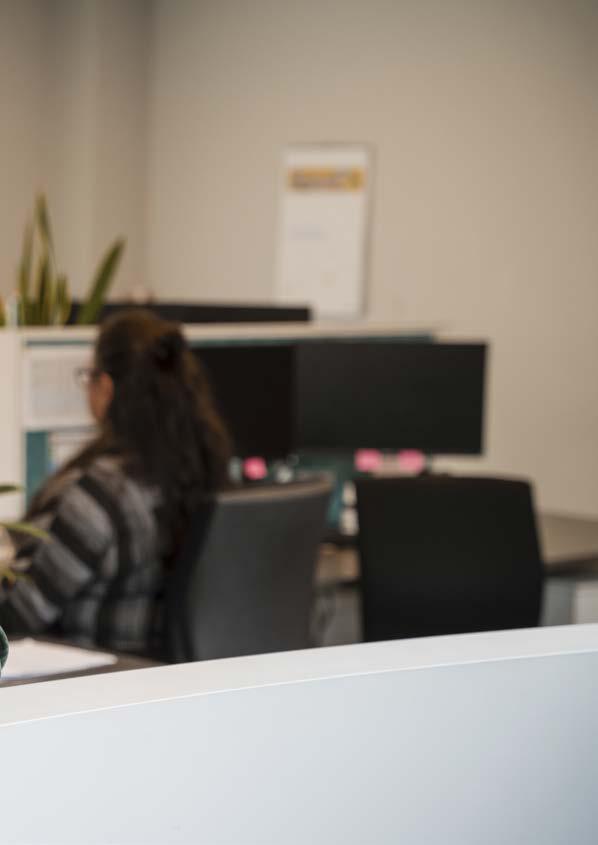
NEW FINANCE MANAGER, ERENA TAYLOR
Ki te taha ki tōku māmā
Ko Te Atiawa, Ngāti Mutunga, Taranaki, Ngāruahine, Ngāti Ruanui ngā iwi
Ko Manukorihi, Puketapu, Ngāti Moeahu, Tiitahi Tamaahuroa, Hāmua Hāpōtiki, ngā hapū
Ko Owae, Muru Raupatu, Urenui Pā, Te Paepae o Te Raukura ki Parihaka, Oeo, me Taiporohēnui, ngā marae
Ko ōku mātua tūpuna ko Tangi Graham, nō te whānau Niwa, rāua ko Wīremu Graham nō te whānau Tito
Ko tōku māmā ko Christine Nicholas
Ki te taha ki tōku pāpā
Ko Margaret Jeffs rāua ko Brian Nicholas ōna mātua, Ko tōku pāpā ko Peter Nicholas. Ko Mangatoki te kāinga.
Ko Troy Taylor taku hoa rangatira, nō Kaipakopako ia Tokotoru ā māua tamariki.
Nō reira ko Erena Taylor ahau.
The journey to becoming Te Rau Tātai Tahuaroa / Finance Manager at PKW for Erena Taylor is a story deeply embedded in the rich, fertile whenua of Taranaki, where she grew up. A childhood spent on a dairy farm gave her a strong sense of commitment to the people and land of Taranaki.
Erena’s early life in South Taranaki was shaped by the rhythms of farming, the importance of a strong work ethic and the enduring influence of her father, Peter, and mother, Christine, who is also a Rau Titikura / Shareholder of PKW.
Erena was also surrounded by her extended whānau, who nurtured a connection to the land and community that she characterises as Taranakitanga - the manifestation of an enduring commitment to the people and the whenua of Taranaki.
“I grew up on the family dairy farm in Mangatoki, South Taranaki, where my father’s whānau had been for several generations. This childhood gave me an insight into understanding farming, and what it meant for generations to be looking after the whenua,” said Erena.

“We later moved up to New Plymouth when I was a teenager, but South Taranaki is still home for me and in my opinion the best side of the maunga,” she jests.
From these pastoral beginnings, Erena’s aspirations extended beyond local possibilities when, with the aid of a PKW education grant, she achieved her Bachelor of Business Studies in Finance and Economics from Massey University in 2003.
Like many of her generation, Erena travelled overseas before establishing her career in Aotearoa. With the benefit of her academic background, she spent five years in the United Kingdom where she worked in various financial and non-financial roles.
“The experience abroad enriched my financial acumen and introduced me to global business practices that now enhance my role at PKW, where we combine international standards with local values,” she said.
Upon returning to Taranaki at the end of 2008, Erena’s career took a decisive turn towards financial management.
“The experience abroad enriched my financial acumen and introduced me to global business practices that now enhance my role at PKW, where we combine international standards with local values.”
Erena Taylor
She joined PwC as an accountant, where her role evolved significantly over the years. While navigating her responsibilities at PwC, Erena embarked on a rigorous academic path, part-time, which culminated in her earning a graduate diploma in Accounting enabling her to become an Associate Chartered Accountant and advance to a senior tax consultant role.
“In 2016, I began working within the finance team at PKW, initially on secondment from PwC for 18 months before it became a permanent position setting me on the path to this new role.”
As Te Rau Tātai Tahuaroa, Erena’s responsibilities extend beyond the typical confines of financial management. She is a steward of the community’s assets, dedicated to both protecting and nurturing the financial health of PKW for the benefit of current and future generations.
“The dinner table conversations I listened to as a child about PKW were my first lessons in business ethics and community responsibility,” Erena remembers.
“I learned there were different views for the same issue, and there were differences between communities’ views between te ao Māori and land ownership of farmers at that time. This in hindsight probably drove my desire to want to work in kaupapa Māori and finance.”
Mentors such as Brent Hulbert from PwC and Joe Hanita, former CFO at PKW, have been instrumental in guiding her through the complexities of balancing a demanding
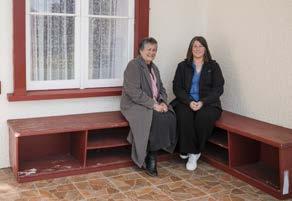

career with personal growth and family responsibilities. Their support, alongside the unwavering backing of her extended whānau - parents, aunties, uncles - has been pivotal to her success.
Erena sees her role at PKW as an opportunity to blend business practices with cultural values, with an emphasis on the importance of Taranakitanga and communityoriented approaches.
“There were times when the balance between personal life and professional obligations seemed overwhelming, but the support from my family and PKW has been crucial,” she shares, highlighting the dual role of her support network at home and at work.
“My whānau are also important role models and support for me over the years - my parents, aunties and uncles, and, of course, my husband Troy. And my tamariki (stepson Tyrone 24, Kaitlin 12, and Charlie 8) – they are constantly challenging and teaching me to grow!”
Reflecting on her journey, Erena acknowledges her success is not solely her own.
“I hope my story can show other wāhine o Taranaki, and beyond that, with perseverance, whānau, and community support, it’s possible to overcome challenges and achieve great things.”
Bottom:
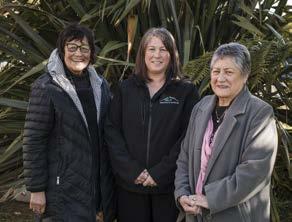
“My whānau are also important role models and support for me over the years - my parents, aunties and uncles, and of course my husband Troy. And my tamariki (Stepson Tyrone 24, Kaitlin 12, Charlie 8) – they are constantly challenging and teaching me to grow!”
Erena Taylor
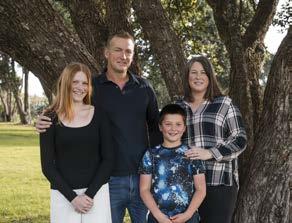
TE RAU KAWARIKI / ASSOCIATE DIRECTOR
Applications for Te Rau Kawariki / Associate Director are now open and close on Wednesday 31 July, 2024 at 5:00pm.
Purpose
The Committee of Management has relaunched the successful Te Rau Kawariki / Associate Directorship programme to continue to develop the governance capability of both Parininihi ki Waitōtara Incorporation and Taranaki Māori as a whole
The Committee seeks applicants from whānau already in a senior leadership position who are committed to contributing to the development of the Incorporation and the aspirations of owners and Taranaki whānui.
Term
Three years - from close of the PKW Annual General Meeting to be held on Saturday 16 November, 2024 to close of the PKW Annual General Meeting to be held in November 2027.
Responsibilities
Te Rau Kawariki / Associate Director is expected to:
• participate in and contribute to monthly governance meetings as though they were a fully elected member, taking a full part in Board discussions.
• develop positive working relationships with other Board members and PKW kaimahi.
• represent the Incorporation with external stakeholders.
• ensure the organisation meets its strategic goals.
Selection Process and Criteria
The selection of Te Rau Kawariki / Associate Director is at the discretion of the Committee of Management.
Applicants must:
• Be a current shareholder or a descendant of a shareholder;
• Have proven knowledge, skills and experience or demonstrated potential to develop in one or more areas of governance: Strategic Planning and Innovation, Communication, Business Acumen, Technology, Leadership, Tikanga Māori and Regional Māori Politics, Networking and/or Human Resources.
• Be committed to the vision, mission, values, and behaviours of the Parininihi ki Waitotara Incorporation
• meet the confidentiality requirements of the Incorporation.
Applications must be received at the PKW office by: 5:00pm on Wednesday 31 July, 2024
Applicants should submit their CV to jking@pkw.co.nz together with a cover letter that sets out their alignment to the criteria, their reasons for wishing to be an Associate Director and includes their vision for the Incorporation.
The successful candidate will be announced at the AGM on Saturday 16 November, 2024
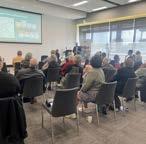
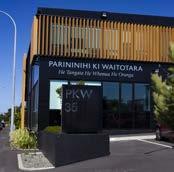
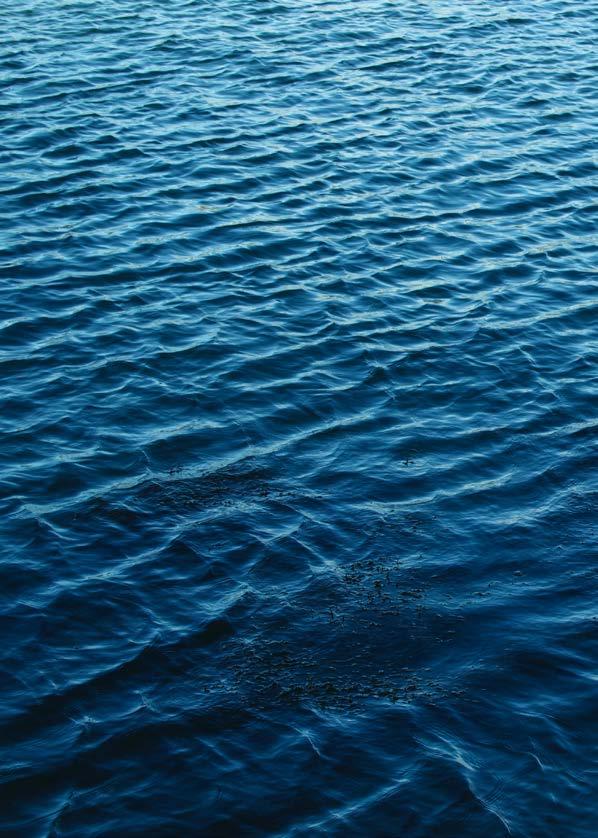
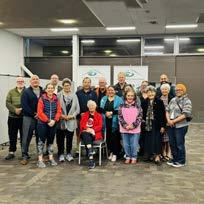
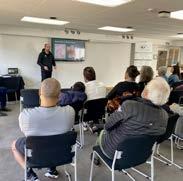
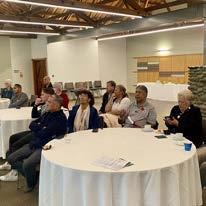
Rautaki 2033, PKW’s refreshed strategic vision for the future of the organisation, hit the huarahi to connect with Te Rau Titikura across the motu.
The five roadshows, in New Plymouth, Auckland, Hāwera, Wellington and Nelson, were an opportunity for owners to learn more about the drive to build a more balanced Papatupu (portfolio) to build greater resilience in a rapidly changing world.
“I value being able to kōrero kanohi ki te kanohi with our Rau Titikura so I get their perspective on what we are doing to deliver value for them” says Aisha Ross, PKW Te Rau Matomato. “The roadshows were well-attended and whānau were very positive about the strategic refresh and provided some really valuable feedback.”
The new Rautaki He Papa, He Tupu, He Ora – Legacy, Growth, Prosperity – Binds together Place, People, Partnership and Performance as central drivers. Papatupu, brings together the portfolio of actively and passively managed whenua, resources, and investments within the organisation.
“The strategy enables us to explore opportunities extending into food and fibre, property, and renewable energy by bringing together the potential of whenua, people, and partnerships,” says Aisha. “That potential is key to new pathways for the future and building on our foundations for our Rau Titikura today and tomorrow.”
“What was particularly notable about the roadshows was the number of younger whānau members who attended to find out more about our kaupapa and our future aspirations,” remarks Aisha. “Rautaki 2033 is a continuation of our journey and being able to kōrero about our kaupapa and connect them with the vision and mahi we do is awesome.”
“I am very keen to continue this style of hui, so we can kōrero directly with our Rau Titikura on a frequent basis. Hearing their aspirations for the future and seeing the passion people have for our kaupapa was a valuable and humbling experience.”
“I value being able to kōrero kanohi ki te kanohi with our Rau Titikura so I get their perspective on what we are doing to deliver value for them”
Aisha Ross
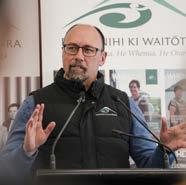
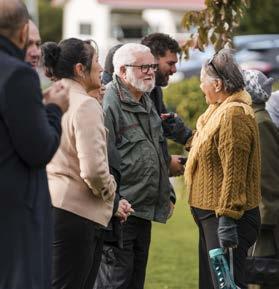
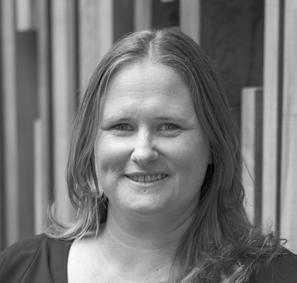
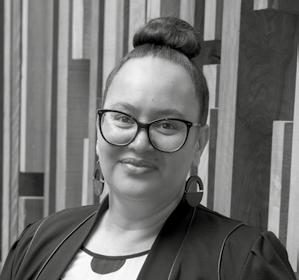
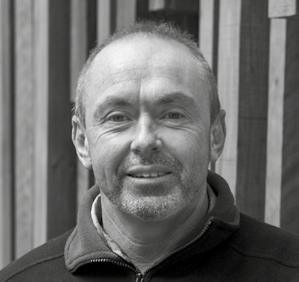
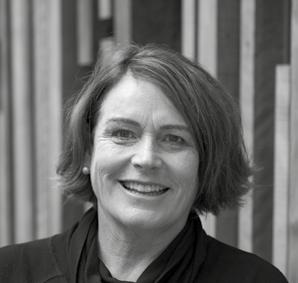

ACKNOWLEDGING A DECADE OF SERVICE
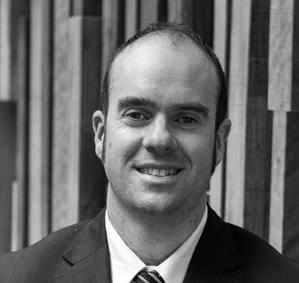
At Parininihi ki Waitōtara (PKW), longevity transcends the simple ticking of a clock – it embodies growth, connection, and evolving as kaitiaki alongside the land and its people. With this recognition, PKW acknowledges the ten-year service of 12 kaimahi, and share the personal thoughts from four of them on the professional growth that has shaped their time with the incorporation.

“PKW has made their vision clear – we look after this land and leave it better than we found it. Things like the riparian planting have made the place beautiful. It looks really good.”
Levi Scown
Te Rau Whakahuka / PKW Farm Manager
“I have a whakapapa connection to the incorporation through my grandmother Shirley Broughton and her brother Barry Broughton O’Brien. And through those family ties, I started working on the Kōkiri farm which was being managed back then by a PKW sharemilker. That kind of got me involved. I gave it a crack, liked it, and stuck to it.
I started on the sharemilking side 16 years ago there, which is Farm 15 now, down Palmer Road. I did six years there, and then I moved to where I am now, at Farm 13 on Skeet Road. I did a year as part of the relief team and have been the manager on Farm 13 for nine years now.
Since my time, I have watched this farm develop from two farms into one big unit. Watching that happen over the years has been pretty cool. Everything is a milestone in my eyes. Reaching small targets all contributes to the big milestones.
PKW has made their vision clear – we look after this land and leave it better than we found it. Things like the riparian planting have made the place beautiful. It looks
really good.
Shane Miles, (Te Rau Whakahaumako/GM Ahuwhenua) I’ve known now for more than 16 years. He’s shown me a lot and taught me a lot. If it wasn’t for him, I probably wouldn’t be where I am today.
Whether my children follow me into this career, I’m not sure. I have three young boys, and I think they might like their weekends off. But in saying that, PKW are the best corporation I have worked for, they’ve come a long way, and I hope they continue.”

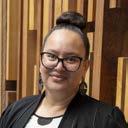
“Working at PKW, I was drawn to the sense of leadership that was courageous and visionary. It was evident in everyone I worked with, from the board to the management.”
Jacqui King
JACQUI KING
Te Rau Whakapuāwai / Head of Corporate Services
“When I first looked at joining PKW, the biggest push came from my aunt, urging me to work for our own. It’s something you just don’t ignore when the call comes from your family, pushing you to contribute to your community.
My father, being a dairy farmer, was deeply involved in the community’s ups and downs, which heavily influenced my decision. Coming from a background where I worked at a commercial law firm, moving to PKW was a significant shift. It was about embracing a role that wasn’t just about career progression but was deeply tied to working for and with our people.
Working at PKW, I was drawn to the sense of leadership that was courageous and visionary. It was evident in everyone I worked with, from the board to the management. This leadership wasn’t just about making decisions; it was about embodying and advocating for our values in every action we took.
What I’ve grown to appreciate the most over the years is how PKW manages to balance professional rigour with a deep respect for our kaupapa Māori. We’re not just running a business; we’re nurturing our community, our land, and our people, ensuring that our operations benefit not just current but future generations.
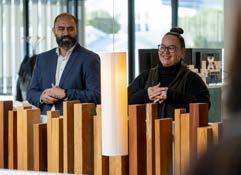
Looking ahead, I see PKW continuing to lead with integrity and innovation. We have a clear vision that respects our traditions while embracing modern governance and management practices. This is crucial as we aim to provide more opportunities for our people and ensure the sustainability of our resources.
My journey here has been about much more than professional growth. It’s been a profound reconnecting with my roots and understanding the power of community-centric leadership. It’s about paving the way for future generations to thrive, knowing their heritage and the land they come from.”
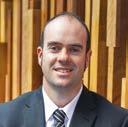
“Now that I’ve been here a while and I’m immersed in the organisation, understanding the tikanga and reo elements that we interact with on a day-to-day basis, you intrinsically know of its importance.”
Shane Miles
MĀ TE RINGA RAUPŌ, MĀ TE RINGA RAUPĀ, KA ORA
Leading capability and professionalism
SHANE MILES
Te Rau Whakahaumako / General Manager Ahuwhenua
“I started working at the incorporation when it was going through changing its organisational approach from being passive to actively involved in the management of its whenua and business: from having sharemilkers to owning our own herds on the farms.
Initially my role was as a farm supervisor, then I moved onto operational management, and I have been in the Te Rau Whakahaumako (General Manager Ahuwhenua) role for the around six years. Being part of the development and seeing those changes from when the farming was outsourced to growing our own management organisational capability makes me proud of the kaupapa that has been nurtured along the way, leading to the growth of the organisation.
You could say it’s like watching the emerging personality of the incorporation and see it mature as an intergenerational business.
However, the successes have gone hand in hand with challenging times. Now that I reflect on that journey, we have just had to get on and do the mahi that needs to be done. It hasn’t been easy, but the kaupapa ultimately creates an overwhelming sense of surety about our intentions bearing the results we are seeking.
Prior to coming into the incorporation I had some sense of its history, and in particular the importance of the whenua to the shareholders. Now that I’ve been here a while and I’m immersed in the organisation, understanding the tikanga and reo elements that we interact with on a dayto-day basis, you intrinsically know of its importance.
The challenge is keeping ahead of the changes in farming practices and expectations. Inside the farm gate we can determine our own path but outside the farm gate, with climate change, and other regulatory issues emerging, we are probably one of the best-placed farming businesses in Taranaki to respond, but still meeting those expectations doesn’t make the job easier and acting on shareholder aspirations into the future.
Post COVID, farm cost inflation has been increasing 20-30% year on year, at a time when milkprices have been relatively flat, which has its impacts on profitability. Nevertheless, the people in the business and the operators we have on farm, are critical to our success. Alongside the on-farm resources and infrastructure we have built up, as well as the efforts of all our people onfarm assists us to keep operating an efficient business. I can’t reinforce enough the mahi and efforts of our people.
I’m thankful for all the Farms Management team members, some of whom are included in this article recognising their long service, and grateful for the mentors/CEOs I have been involved with in my time at PKW –from Dion Tuuta, then Warwick Tauwhare-George and more recently to Aisha Ross – and their leadership that has been provided. It’s enabled me to get on and do my job.”

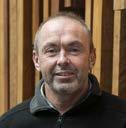
TŪ TE NGANAHAU
“This role has allowed me to delve further into the intricacies of the business and its rich heritage dating back to the 1860s.”
Roger
Landers
Being resilient and forward thinking
ROGER LANDERS
Te Whakaraupā Ringa / Business Manager
“Over the past ten years with PKW, my journey has been both enriching and challenging, presenting numerous opportunities for growth and reflection. When I started, my role was largely centred on overseeing dairy farm operations. Coming from a background in dairy farming and having some prior exposure to PKW through family connections, I was familiar with the organisation but unaware of the depth of its history and operations. This role has allowed me to delve further into the intricacies of the business and its rich heritage dating back to the 1860s.
One of the standout benefits of working with PKW has been the opportunity to engage with and learn from a diverse group of dedicated individuals. The support from Shane Miles, who has been a constant leader, and the collaborative spirit of colleagues like Bronwyn and other long-serving staff members, has been instrumental. These relationships have not only made my job easier but have also fostered a strong team dynamic that is crucial for success.
The opportunities have been vast, from overseeing the development of new dairy farms to navigating the complexities of compliance and environmental sustainability. The shift towards greater regulatory compliance, especially in areas like greenhouse gas emissions and health and safety, has been significant.
These changes have required us to continually adapt and improve our practices, ensuring that we remain ahead of the curve without becoming complacent.
However, these advancements have not come without challenges. The increasing demands for compliance and the need to constantly update our practices to meet new standards can be daunting. Yet, these challenges also push us to innovate and refine our operations, making us more resilient and forward-thinking.
Despite the inevitable hurdles – be it economic fluctuations, environmental challenges, or operational setbacks – we have consistently strived to add value and uphold the principles of stewardship and sustainability.
The yearly AGM also serves as a reminder of our mission and the collective efforts of our shareholders, reinforcing the importance of our work.”
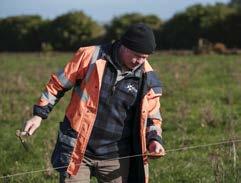

KIA MĀMĀ TE NGĀKAU
“The journey has been marked by the integration of our values into every aspect of our operations. Initially, there wasn’t a strong health and safety culture within the farming industry at large, but we set out to change that as a business and ensure that our practices were on par with any leading business, not just in farming but across all sectors. ”
Browyn MacFarlane
TE TINANA
Growing Health & Safety Culture
BRONWYN MACFARLANE
Te Rau Māheniheni / H&S Manager
“When I first joined the PKW team, it was like stepping into uncharted territory – a blank slate full of possibilities. We weren’t trying to fix something broken; we were building something entirely new from the ground up. This fresh start was a significant drawcard for me. I remember saying to our CEO at that time, Dion Tuuta, ‘We’re not watering anything down because we’re farmers. We’re going to be as good as any other business.’ That commitment has been a guiding principle throughout my time here.
The journey has been marked by the integration of our values into every aspect of our operations. Initially, there wasn’t a strong health and safety culture within the farming industry at large, but we set out to change that as a business and ensure that our practices were on par with any leading business, not just in farming but across all sectors. The leadership’s support, especially from Dion, has been pivotal. Their buy-in and enthusiasm have driven our success.
One of the most fulfilling aspects has been watching the company grow and evolve. We’ve expanded into new areas like forestry, each bringing its own set of challenges. But it’s this constant change and the need to adapt and improve that keeps us from becoming complacent. Working with our contractors and helping them build their capabilities has been particularly rewarding. It’s a testament of our commitment not just to our success but the success of everyone we work with.
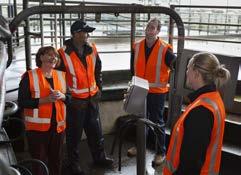
Looking ahead, maintaining our health and safety standards while aligning with our core values is crucial. It’s not just a regulatory requirement; it’s integral to our business philosophy. Our shareholders have also evolved in their understanding and appreciation of these efforts. They value success stories, and my goal has always been to provide those, showing them that we’re working hard on their behalf.
Throughout this journey, I’ve been fortunate to work with some incredible people. The support from Shane Miles, Roger Landers, Jacqui King, and our long-term contractors, has been outstanding. It’s this strong network and shared dedication that have made the past decade at PKW so remarkable. Good health and safety practices are fundamental to good business, and that’s a principle I’m proud to have helped embed deeply into our operations.”
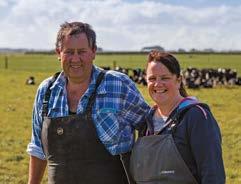
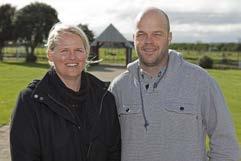


The reflections of Levi, Jacqui, Shane, Roger and Bronwyn underscore a decade marked by significant achievements, personal growth, and an unwavering dedication to the kaupapa and community they cherish – rooted in tradition, driven by innovation, and dedicated to the prosperity of their people and their land.
PKW wish to also acknowledge the following kaimahi for their long service:
Bex Kelbrick
Te Whakaraupā Ringa / Business Manager
Ross & Shelley Clark
Te Rau Āwhina / Farming Partner, Farm 9
Trent & Pip Olliver
Te Rau Āwhina / Farming Partner, Farm 11
Matt Kelbrick
Te Rau Āwhina / Farming Partner, Te Ruru
Chris Paterson
Te Rau Whakamaru / Drystock Farm Manager
John Harold
Te Rau Whakamaru / Drystock Farm Manager
The rent review process is making slow progress with the appointment of an arbitrator to provide clarity and definition to aging legislation in a modern-day context.
PKW and the West Coast Settlement Reserves Lessee Association have been working together to set the fair annual rent over 260 whenua tupuna parcels since the middle of last year but have not yet managed to reach an agreement.
In order to maintain momentum, both parties have moved to arbitration, where legal representatives for each side will present their case, and a presiding arbitrator (retired High Court and Court of Appeal judge) passes down a decision, called an award.
“Before we can agree on a fair annual rent, we have to agree on the value of the unimproved land - which is what the land would rent for in its original state, i.e. if no improvements existed,” explains Te Rau Whakahono Pito Richard Buttimore. “Before we can do that, we must agree on what constitutes an improvement and what doesn’t.”
“And in order to do that, we have to follow the ageing legislation on the subject.”
“The picture becomes even murkier when you consider the amount of additional legislation that has been passed since the commencement of the leases, such as the Resource Management Act in 1991, for example.”
“Add in the fact that each party is coming to the discussion with opposing perspectives and it’s really no surprise that finding a common point on which to agree is proving difficult.”
Arbitration will provide the defining legal interpretation under present day conditions for the legislation, providing the foundation for PKW and the Lessees to progress towards an agreement.
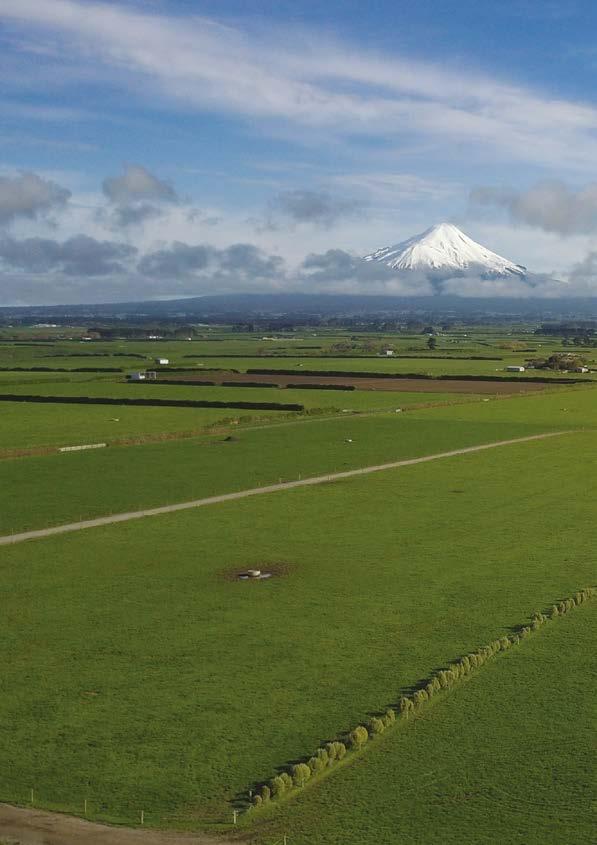
“Before we can agree on a fair annual rent, we have to agree on the value of the unimproved land - which is what the land would rent for in its original state, i.e. if no improvements existed”
Richard Buttimore
“This is not a new process for us, as we went to arbitration after the first Fair Annual Rent review following the Māori Reserved Lands Amendment Act in 1997, the outcome of which stood us in good stead to reach agreement in 2010 and 2017,” says Richard. “But the legal environment we are working in when making these agreements has become less clear once more so both parties have agreed to arbitration again. The award will also help provide a clear road map for future reviews, as it did before.”
Rent paid by lessees is a significant revenue stream for PKW, so it is important that the interests of the Incorporation are protected.
“This is another step forward in what is a very complex matter and I want to acknowledge the significant mahi being put in by our legal team and subject matter experts on this kaupapa.”
“We will continue to work in partnership with the West Coast Settlement Reserves Lessee Association in an attempt to bring the review to as satisfactory a conclusion for all parties as possible.”

MANGAOAPA KIWI HABITS
EMERGING FROM EARLY DATA
Early data collected from five kiwi in the groundbreaking Mangaoapa Forestry Block research project is starting to sketch a fascinating picture of kiwi life in the area.
For the past year, information has been collected from transmitters attached to the legs of five kiwi, three males and two females. It’s part of a long-term study – planning began three years ago – looking at what happens to kiwi before, during and after pine harvesting.
Parininihi ki Waitōtara (PKW), Te Kāhui Maru, East Taranaki Environment Collective (ETEC), Taranaki Kiwi Trust and NZ Forestry are partners in the taonga species research project.
Owned by PKW, the 400-hectare Mangaoapa block near Purangi, east of Inglewood, is predominantly covered in radiata pine (about 300ha) and edged in native forest (100ha).
ETEC Conservation Manager Kat Strang said that while the kiwi data collection was still in its early stages, it shows kiwi are using their normal habitat of native forest, as well as pine with native shrubs and ferns in the undergrowth.
Western Brown Kiwi typically nest between July through to February. Last breeding season all three pairs nested, although one was unsuccessful. Three clutches were incubated, with anywhere from three to six chicks hatched. The nests were scattered around the different habitats, with one in native forest, two in pine with native undergrowth, and one male kiwi nested at the base of a mature pine, in a pine area with no undergrowth.
“We’re very excited about this research project. We’re learning quite a bit about this population and it has been a really great experience working with the forestry crews as well,” Kat said.
“We tend to think of kiwi hanging out in native forest, but they use whatever they have. At the moment, they’re doing their normal kiwi thing – using their habitat, pairing, nesting successfully. Over time, as the trees are felled, we’re interested in what happens to those kiwi.

“We’re very excited about this research project. We’re learning quite a bit about this population and it has been really great experience working with the forestry crews as well,”
Kat Strang
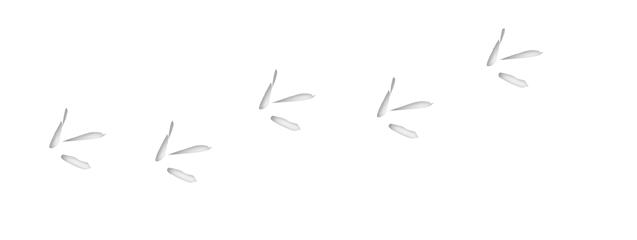
“The pre harvest data is really important to determine how kiwi are spending their time between the different habitat types and what their ‘normal’ breeding rates are prior to disturbance. We can then compare how the disturbance affects these parameters to get a good idea of the impacts on kiwi.”
Sian Potier
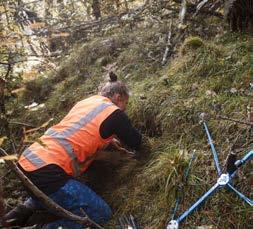
“Even though it’s a small population study, it will provide valuable data about the impacts of forestry and clear felling on kiwi populations living in those forests.”
Felling of the valuable Mangaoapa timber crop planted in 1992 began in a contained area at the end of November last year, allowing roads to be built. Clear felling in parts of the pine forest started in the past month or so.
NZ Forestry staff trained by Taranaki Kiwi Trust to use equipment to get transmitter bearings on kiwi have so far confirmed none were in the immediate area they were working in.
Kiwi location readings are taken every couple of days. Once a week, forestry staff also spend about 30 minutes taking more in-depth readings for data that shows things like time spent on a nest and how long a kiwi feeds every night.
Forestry Manager for NZ Forestry, Katrina Boon, said PKW’s foresight to enter into this research project will benefit kiwi and foresters throughout the country.
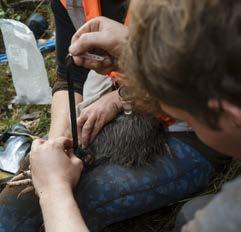

“We’re loving being involved – it proves production forestry and conservation can exist side by side. I’ve not heard of any other project like this, where kiwi are fitted with transmitters in production forests. It adds another facet to the operation,” Katrina said.
“Everyone is very interested in this work. Who doesn’t love a kiwi? We’re hoping this work will tell us, one way or the other, how kiwi react to loud noise and disturbance. Best practice tells us to make a loud noise and kiwi should move on from an area. But there are many anecdotal stories about kiwi that refuse to move, so the more data we get, the better.”
Taranaki Kiwi Trust Conservation Manager Sian Potier said that, among other things, data analysis at the end of the pre-harvest period will look at the percentage of time kiwi spend in the pine forest as opposed to native areas.
To improve the kiwi population sample size, researchers were aiming to attach transmitters to three additional kiwi, bringing the total number being monitored in the block to eight. Sian said the intention was to map pair territories and capture breeding data pre harvest, during harvest and post-harvest.
“The pre harvest data is really important to determine how kiwi are spending their time between the different habitat types and what their ‘normal’ breeding rates are prior to disturbance. We can then compare how the disturbance affects these parameters to get a good idea of the impacts on kiwi.”
PKW Te Rau Mātorotoro / Procurement Coordinator
Jenny Feaver said that with so little research focused on this kaupapa up until now, “it’s about sharing as much as we can … whatever data we get may be able to support refreshing the NZ forestry management harvesting guidelines currently in place.”
PKW has a strong commitment to the environment and understanding more about taonga species such as kiwi, with Te Koioratanga (biodiversity), a key pou in its Kaitiakitanga Strategy.
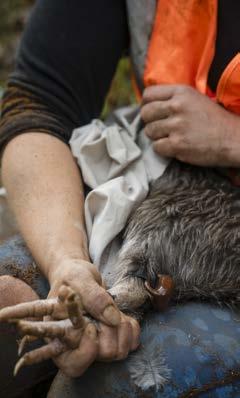
Images
Kat Strang, ETEC Conservation Manager, and Corbyn Fabish, ETEC Ranger, track male kiwi bird Mapere in the Mangaoapa Forestry Block in May 2024. Mapere was found in a large burrow with his mate Manawa and is in really good condition. His transmitter was updated before he was returned to his burrow to finish his nap.
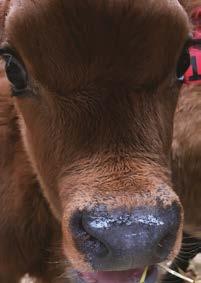
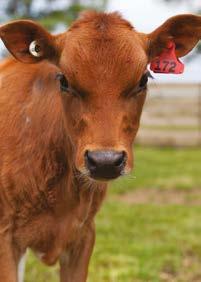

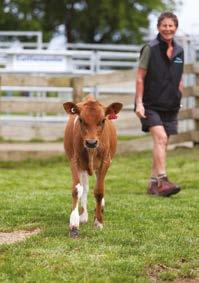
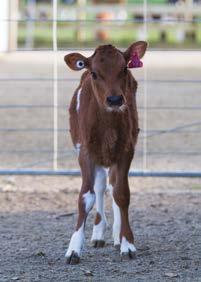
MERE THE COWWHERE IS SHE NOW?
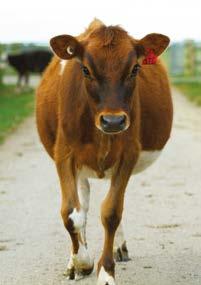

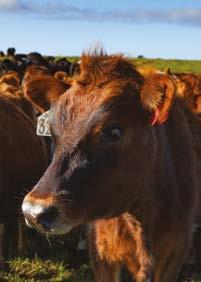
When we last met, in 2017, I was a lively young heifer living at PKW Farm 21 in Waverley and hoping to get pregnant for the first time.
Well, all went according to plan. The jersey bulls arrived and followed me and my girls around for what seemed like ages. To be honest, they got a bit annoying with all their stamping and bravado. So immature. But, you know, things happened and my first calf was born in July 2018, a beautiful girl who took after her gorgeous māmā.
I’ve had four other calves since then – three girls and a boy. And, can you believe it, I’m pregnant again, due in September. There’s still life in this strong old girl!
My farmers will stop milking me around May so my udder has time to rest and reset itself for the next baby. I’ll need to build up my reserves, prepare for a safe birth and, of course, have lots of energy to produce lots of milk.
Now I’m almost eight and in the ‘mature’ stage of life, happily settled on Te Kāhu farm at Ōhangai, south-east of Hāwera. I’ve been here four years after moving five times. It’s nice to be in one place and I love its special name. Apart from my birth farm, Waitokorau, the other places I lived only had numbers. Ngā mihi to Meremere Marae for naming my home after an awesome manu; the Kāhu often park up next to me and hang out.
We’re a big mob of 520 cows so it’s very sociable. Us older mums are all mates and, of course, we gossip and brag like you humans. I bet you didn’t know we cows have our own voices and use different pitches to interact and express emotions. Like, we can moo when we’re hungry, raise the alarm to warn about potential danger, call out to a mate for a kōrero.
As the queens of the herd, we whaea think it’s our duty to keep an eye on the younger ones, make sure they know their place. Cows like order when we’re walking to the milking shed. We’re not sticklers for hard and fast rules but we generally keep to the front, middle or back. With a little encouragement the first-timers soon figure out where they fit.
The old saying that happy cows produce healthy milk is true. I can’t complain. Apart from one holdover year, my

stats show I’ve ranged between 190 and 256 lactation days a year since 2018. In dairy-speak that’s good going.
I wear a very cool Allflex collar. No, it doesn’t have a bell – I’m not Swiss. It monitors for any health alerts, picking them up two to three days earlier than a good farmer or vet could. Last year I got mastitis, which is an infection in your udder. Crumbs, it was sore! But the farmer was on to it straight away, dosing me up to keep me healthy.
Now I’m in great shape going into winter. Hooves crossed for a healthy spring birth! Happy Puanga to you all whānau.
Me mutu pea i konei!
This is the last update from Mere. Whenua hopes you have enjoyed following her journey.
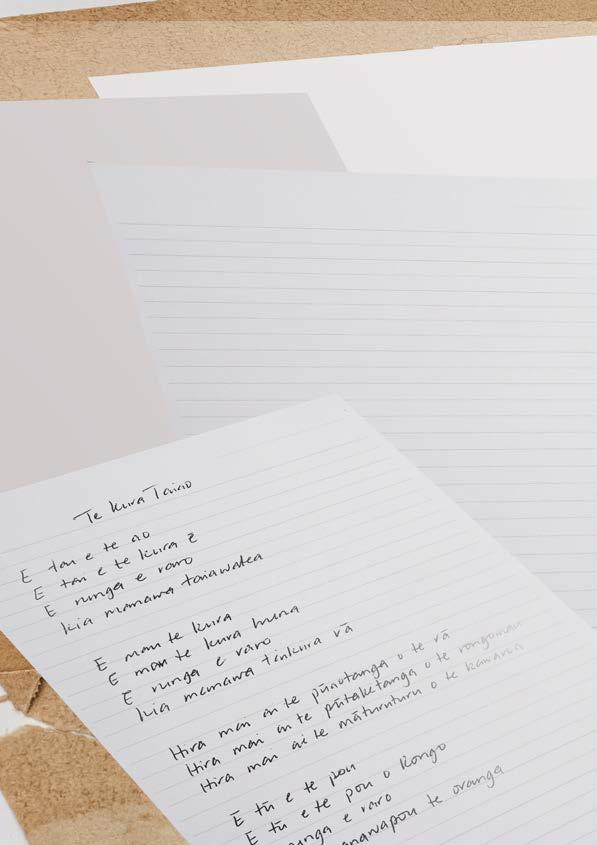
Uia mai koe ki ahau he aha tā te Māori aronga ki te kupu ‘taiao’, he māmā noa iho te kī, kei roto i tō tātou ao ko te huhua o nga momo tai e papaki mai ana ki te aroaro o te tangata, ā, he au ōna, he pae ōna, he riponga ōna, ka mātiketike, ka mārangaranga, ka teretere, ka mimiti, ka timu, ka pari – ka whakahāngaihia tōna mana ki te tangata mā roto mai i ōna āhua katoa. I tua atu i te kī, he taiao te taiao, ko te āki kei roto i te ūpoko kōrero o runga ake nei ki te ao tonu, kia tai i a ia ngā tai kei roto i a ia. Tērā e tutuki te wāhi ki te mana o te taiao – kia kapua mai e te ao ngā tai, kia tuku reretia e ia ngā tai, kia wero i a ia te tangata ki te kimi i tōna taupua, kia mānu ai, kia punga whakawhenuatia ai, ā, kia takina ngā ruruku ki runga i ngā māwe, inā whakauruora haere ai ki whenua tauhou.
I konā, kāore hoki i ārikarika ngā whakatari, kāore hoki i ārikarika ngā momo purenga. He whakatūpato kei roto, engari, he oranga kei roto. Nō roto mai i te tikanga o te iriiri tae atu ki te wā e unuhia atu ai e Tangaroa kia kautere i a ia te haere o rangi-kekero me rangi-totohu,
ka nunumi atu te tangata ki te pō – ko te hononga o te taiawatea ki a taiahiahi. Ko tā te ao kawe i te tupu o te tangata tēnei. Ka mutu, e meinga ana ko te mauri o te wai hoki tēnei e teretere nei ki roto i te tai.
Engari ki te whāia tonuhia te whakaaro o runga ake nei, ehara i te mea ko te mauri o te wai ānahenahe nei te mauri e hāngai nei ki te tai. E mārama ana ko te mārama tonu tērā e kukume nei i te tai kia paripari, kia timutimu. E mārama ana ko te ngākau me hōna tairongo e kukume nei i ngā kare-ā-roto kia tukituki, kia mahea. E mārama ana ko te hirikapo hoki tērā e kapohia ana i a taimahara kia papaki, kia tōngainui. No reira, ka tōia whāitihia e au hēnā kōrero o runga ake hei whakaahua ake i te pūtaketanga o te kupu taiao me te āki kei roto, ‘E tai e te ao’. Ko te whakamāramatanga e whāia nei e puta ai te ngako o te kupu ‘taiao’, he rite tonu ki te kawaora, he rite tonu ki te matemateāone, he rite tonu ki te whāinga roatanga o te kura kia mou. Kāore noa iho i mātakitakina kāpā ianei he kai noa iho mā te karu, engari mō tēnā. Me rongo, me ruku, me mau, tērā e paku mārama ai. Waihoki, nēi kore e tuku i a koe tonu kia pākia koe e te tai – e kore e rongo. Heoi, ko tā te Māori, he āki i tōna taiao, he whakahau i ōna atua, he pupuru i tōna mouri kia mau kia ita.

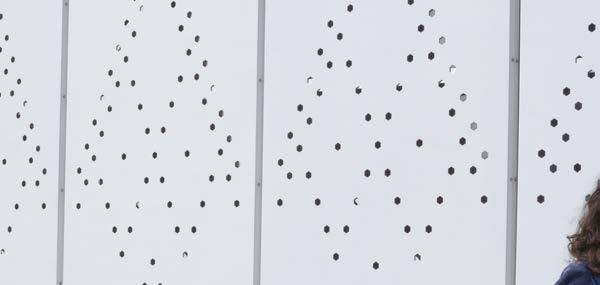
Anaru White, Trustee for Owae Marae, shares how the transformation of Tamawahine dining room at Owae Marae was part of an initiative aimed at rejuvenating marae infrastructure while preserving intergenerational aspirations.
Reflecting on the legacy of previous trustees whose aspirations set the foundation for today’s efforts, Anaru recalls “It’s great to look back because a lot of what’s happened at Owae has been because of the generations before. As trustees, we’ve always been guided by those [ancestral] directives.”
“We are committed to keeping the aspirations of our tūpuna alive, and that was always around the upkeep of the marae. But it wasn’t until funding support from the provincial growth fund happened that we were able to make a start.”
The recent renovation projects have also become a focal point for re-engaging the community. Many of the volunteers/kaimahi involved with the marae span across generations of local whānau, who have always played a significant role in supporting and maintaining the marae so that it can host everything from tangihanga, to celebrations, Māui Pōmare weekend, and important tribal hui, such as PKW annual general meetings.
The initiatives included not only renovations but also constructing new facilities, supported by grants like the $22,000 from PKW, which Anaru highlights as crucial for their success.
“With this funding support we were also able to host the formalities around the opening of the new Tamawahine dining room building. These important gatherings enable us to involve younger generations, to ensure the transmission of knowledge and the continuation of cultural practises. PKW’s role, through scholarships and volunteer opportunities, is instrumental in this reengagement, nurturing a fertile ground for community leaders to emerge.”
Expertise from external organisations like the Māori Land Court is also pivotal. Anaru notes, “Their guidance helped us navigate through the complexities of environmental and regulatory mandates, ensuring our projects not only stand strong today but for generations to come.”
However, Anaru recognises that sustaining engagement with rangatahi remains a persistent challenge. He feels that informal kaupapa are key to keeping the flame alive. “We need to continually find ways to connect with our young people, making them feel a part of our journey.”
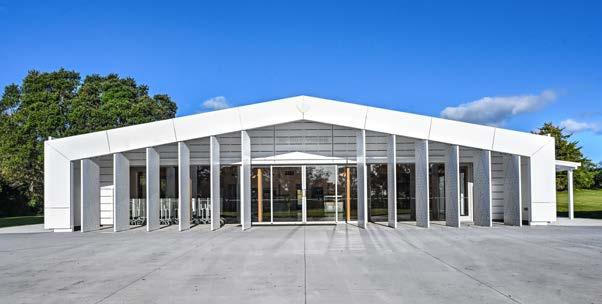
“Our collaboration with PKW and their taiao teams demonstrates a shared commitment to sustainability and cultural heritage.”
Anaru White
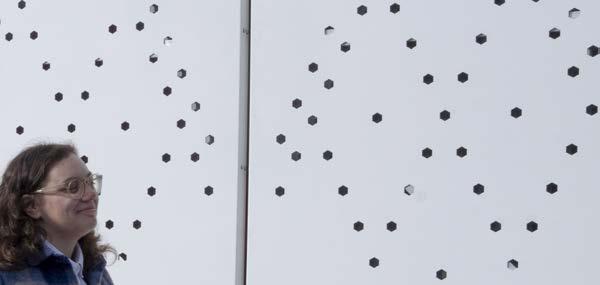
“PKW have demonstrated, and not solely through their funding, that they are supporting our marae because they also send us their kaimahi from their taiao team to help with some of the work around the grounds. Being seen to do the heavy lifting during those times definitely shows our rangatahi that there is a natural fit with the kaupapa of PKW and ours”.
This history of PKW’s support for local hapū initiatives around emerging issues that the trustees and marae community see as important suggest a promising horizon for collaborative ventures. “The potential for future partnerships is vast and can significantly amplify our efforts in community and environmental initiatives,” says Anaru.
The present renovations of the carvings for Te Ikaroa ā Maui has enabled some of the different generations to be involved in its ongoing preservation.
Anaru recognises that relying on key people with the knowledge and expertise they make readily available is not sustainable without a plan to encourage rangatahi to be more actively involved.
“These renovations and the active participation of our rangatahi are not just about maintaining physical structures. Our collaboration with PKW and their taiao team demonstrates a shared commitment to sustainability and cultural heritage. Looking ahead, we envision these partnerships to grow stronger, and to empower our community to uphold the legacy left by our tūpuna.”
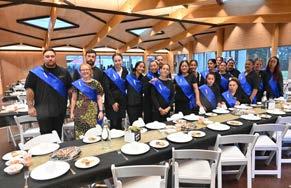
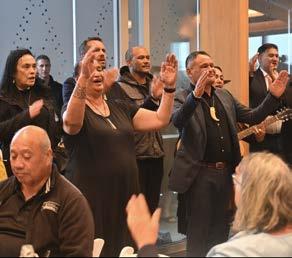
The new Tamawahine dining hall is a stunning building both inside and out, and has the capacity to seat 230 people. Images supplied by pip Guthrie.
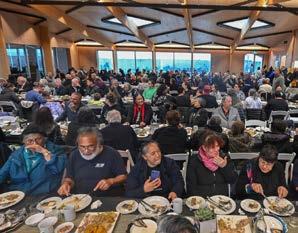
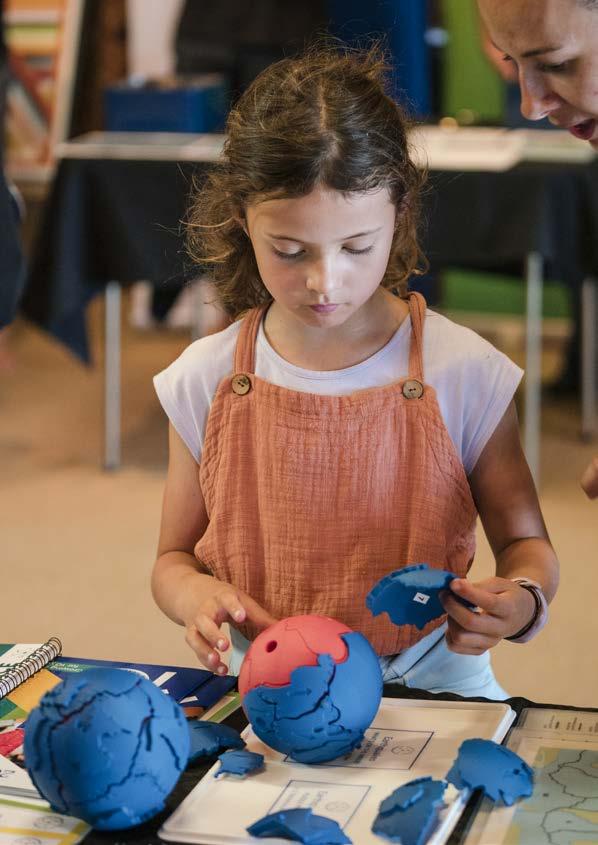
REACHES TAMARIKI IN TARANAKI AROUND THE MOUNGA
How is a battery put together? What makes objects fly? Why does heat cause corn kernels to pop? What does it take to launch a rocket into space?
These are just some of the questions ākonga explore thanks to hands-on science kits provided by the national charity, House of Science / Te Whare Pūtaiao.
“Children are naturally curious and love being able to carry out experiments themselves,” says Melissa Surgenor, a kaiako who uses the kits with children in Years 3–6 at Moturoa School.
“Children who find other forms of learning more challenging really engage with the kits. The material is linked with the science curriculum and come with enough equipment for everyone to be involved.”
For example, the kit, Food for Thought / He Kai mā te Hinengaro, tied in with the school’s Food to Table programme where they grow and eat their own kai.
“It helped them understand what was going on in the garden and in the kitchen. They made popcorn and learnt that as the tiny bit of moisture inside the kernel heats up, the steam causes it to explode.”
Moturoa School is one of 15 primary schools supported by the Te Rau Manawaora PKW Trust. They are either kura kaupapa or have high numbers of tamariki Māori.
The bilingual kits for Year 0–8 ākonga are lent out on a subscription-based library system and the Trust pays the schools’ annual sub.
“It’s a no-brainer in terms of reaching our tamariki around the maunga,” says Puna Wano-Bryant, Te Rautitikura / GM Stakeholder Engagement for PKW.
“Interest in science, especially in relation to te taiao, comes naturally to our children. Schools aren’t resourced to provide exciting, hands-on science on this scale. And the bilingual te reo Māori instructions are a bonus.”
Puna Wano-Bryant
“Interest in science, especially in relation to te taiao, comes naturally to our children. Schools aren’t resourced to provide exciting, hands-on science on this scale. And the bilingual te reo Māori instructions are a bonus.”
Deborah Jones, a former kaiako, works with a team of volunteers to deliver, collect and replenish the kits on a two-week cycle.
“I want to give the biggest thanks to the PKW Trust. They helped kick-start us in the region. 43 schools are now signed up and demand is growing,” she says.
It is not hard to see why. Deborah’s base at St Joseph’s School in Waitara stores 39 different kits across the four strands of the science curriculum: material, physical, living world, planet earth and beyond. They are packed full of experiments, demonstrations, inquiries and a teacher’s manual.
“Everything is in there, enough equipment for a class of 30. For example, 30 rulers or 30 beakers. The idea is to make it as easy as possible for a school, so there are no barriers to learning science,” says Deborah.
Images
Hands-on science kits are a big hit with tamariki who really engage with the learning opportunities they present.
A former head of science at Tauranga Girls’ College, Chris Duggan, started House of Science / Te Whare Pūtaiao to build scientific literacy in schools. She wanted tamariki to understand science concepts and processes they encounter in their daily lives.
“In 2013 I saw an ERO report where only about 27% of the schools they saw had an effective science programme in place. I thought ‘this isn’t good enough’ and then and there chucked in my job to set up this charity with the view of empowering primary teachers to deliver science lessons in their primary classrooms.”
“We’re seeing a shift in teacher confidence which for me is a bottom line. It’s all about building up the teachers and giving them the tools,” says Chris.
Melissa wants to inspire ākonga to choose science subjects at high school because they’ve had a good experience at primary school.
“I love sharing my passion for science with the children. The kits teach basic principles and you can leap frog from there. One class started with launching paper planes, then made launchers for the planes and paper roller coasters. They tested, recorded results, changed designs.”
The challenge for the programme in Taranaki is to fund enough kits to service all the kura wanting to join. PKW was one of the first to provide support, paying $3000 for the Spaced Out/Ki Tuarangi kit.
“For the agri-business sector that uses the land or extracts resources for commercial benefit, this is a hugely positive way of giving back. We’re helping to breed the next generation of mātauranga ‘mauri’ scientists,” says Puna.
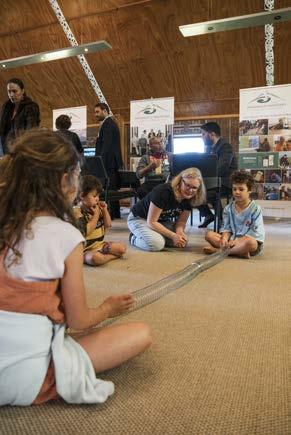
“We’re seeing a shift in teacher confidence which for me is a bottom line. It’s all about building up the teachers and giving them the tools.”
Chris Duggan
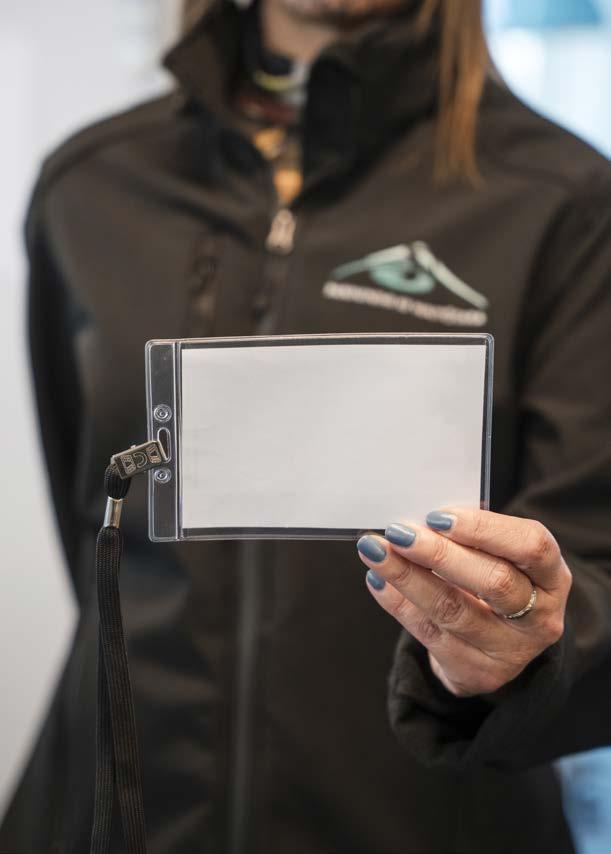
THE MEANING AND SIGNIFICANCE OF ROLE TITLES AT PKW
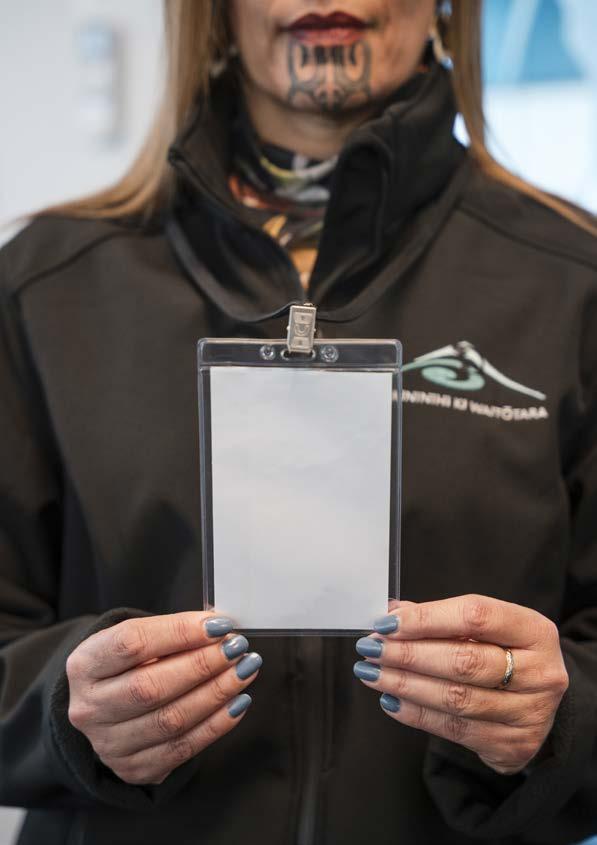
Ngā Ingoa o Ngā Rau Hāpai o PKW are names of the kaimahi roles at Parininihi ki Waitōtara (PKW). The titles are cultural expressions that symbolise the remnants of the past and pave the way for continued growth and development.
Puna Wano-Bryant, Te Rautitkura/General Manager
Shareholder Engagement, explains how meaningful titles are important to upholding the story and identity of PKW.
“The names we use need to reflect our unique identity as a Taranaki Māori kaupapa and, in its formal sense, a Taranaki Māori Incorporation which has inherited the remnants of whenua through a leasing regime and are charged with the responsibility to give prosperity to our people.”
All titles begin with a prefix of ‘Te Rau’ denoting a collective connection to PKW and referencing the legacy of raupatu and the endless pursuit of reconnection. The rest of the title emphasises distinct characteristics, skills, and experiences that people possess and are fundamental to the Parininihi ki Waitōtara kaupapa.
Puna and Tonga Karena offer an intriguing insight into the meaning behind some of the titles.
General Manager Ahuwhenua
Haumako refers to whenua haumako - land that is rich and fertile. This characteristic of Taranaki whenua made for a conflicting and confronting past, however, today it provides the opportunity for prosperity.
Te Rau Whakahaumako ensures the responsible and sustainable treatment of whenua, and the fertile land gifts holistic wellbeing in return.
Te Rau Whakahono Pito
General Manager Property
The Pito is a section of the umbilical cord and refers to the sacred aspects of the birthing process. The name also connotes the practiceof returning the placenta to the whenua: a representation of Māori inherent synergy and links with the land. Whakahono Pito is the process of repairing past severances by reconnecting Māori to the whenua, to their whakapapa, and restoring their identity to Taranaki.
Senior Financial Accountant
The Māripiripi is a traditional knife made from shark tooth that is used to cut through hard surfaces. The kupu is richly embedded in a plethora of Taranaki tupuna kōrero. Māripiripi represents sharpness, precision, and meticulousness; qualities that are upheld by the person responsible for analysing financial transactions and clearly conveying the financial state of Parininihi ki Waitōtara.
Charles Bailey Scholar
The kupu Toi means pinnacle. Te Rau Matatoi depicts the ‘face’ of the person who possesses knowledge, creativity, and expertise in their chosen field of study. The title is granted to the PKW top scholar awarded the Charles Bailey Scholarship – the highest achievement within PKW scholarships and is a recognition of the pursuit of excellence.
Grant and Scholarship Recipients
Matatau describes being learned, experienced, and competent. Te Rau Matatau is a collective term for all PKW scholars who have achieved their tertiary qualifications. The name acknowledges the accomplishments achieved by these scholars and their proven dedication to their educational pathways and aspirations as Taranaki Māori.
The list of ngā ingoa o ngā rau hāpai o PKW continues to expand as the incorporation grows and the introduction of new roles are established.
Below is a list of additional roles which we will further explore in upcoming issues of Whenua magazine.
Te Rau Māhenihei - H&S Manager
Te Rau Whakauruora - Kaitiaki Cadet/Kaitiaki Taiao
Te Rau Tātai Kura - Shareholder Engagement Advisor
Te Rau Mātorotoro - Procurement Coordinator
Te Rau Mātai - Drystock Supervisor
Te Rau Paetawhiti - Postgraduate Scholar
Te Rau Paetata - Undergraduate Scholar
Do you or your whānau know any of the people on the list below?
Each of them holds more than $16,800 worth of unclaimed dividends and PKW would love to reconnect with them.
Unclaimed dividends are held by PKW on behalf of the owners.
To update contact details or inquire about shareholdings or succession, email reception@pkw.co.nz or phone 0800 759 462
To check the missing shareholders list, please go to www.pkw.co.nz or scan the QR code below:
35 Leach Street | New Plymouth 4310 Taranaki | New Zealand
2024